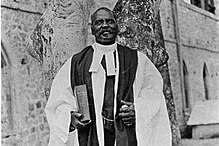| Bedwardism | |
|---|---|
 | |
| Classification | Afro-Jamaican |
| Origin | 1889 Jamaica |
| Other name(s) | Jamaica Native Baptist Free Church |
Bedwardism, more properly the Jamaica Native Baptist Free Church, was a religious movement of Jamaica.
Origins
Bedwardism was founded in August Town, Saint Andrew Parish, in 1889 by Harrison "Shakespeare" Woods, an African-American emigrant to Jamaica, and named for Alexander Bedward (1848–1930 [1]), who was referred to as "That Prophet" and "Shepherd."
It was one of the most popular Afro-Jamaican politico-religious movements from the 1890s to the 1920s. Bedwardism attracted tens of thousands of followers with a call for social justice, as well as socioeconomic programs for the lower classes.
Beliefs
Bedwardian literature describes Bedwardism as a new religion, the successor to Christianity and Judaism. Its actual teachings differ little from those of most Christian denominations, stressing the importance of recognizing Jesus Christ as both God and man in part of the Trinity, as well as frequent fasting. Even so, because the movement likened the ruling classes to the Pharisees, it met with disapproval and even suppression by them. One of the few unique concepts of Bedwardism is the belief that August Town, Jamaica corresponds to Jerusalem for the Western world. . [2] [3] [4] [5]
Bedward himself claimed at times to be the reincarnation of prophets including Moses, Jonah and John the Baptist, and was ruled insane by courts on two occasions. [6]
Death and legacy
The movement lost steam in 1921 after Bedward and hundreds of his followers marched into Kingston, where he failed to deliver on his claim to ascend into Heaven, and many were arrested. In 1930, Bedward died in his cell of natural causes. [7]
Many of his followers became Garveyites and Rastafarians, bringing with them the experience of resisting the system and demanding changes of the colonial oppression and the white oppression. Rastafari casts Marcus Garvey as a Messiah, while also casting Bedward in the role of John the Baptist.
See also
References
- ^ Bedward’s Tomb.
- ^ A. A. BROOKS. (1917). History of Bedwardism —OR— The Jamaica Native Baptist Free Church, Union Camp, Augustown, St Andrew, JA., B.W.I. (PDF). JAMAICA: THE GLEANER CO., LTD. pp. 31 Pages.
- ^ Stan Simpson and David Person (2003). Home away from Home:Africans in Americas Volume1 Ch19 Land of Maroons (PDF). Institute for Advanced Journalism Studies. Archived from the original (PDF) on 2009-07-04. Retrieved 2008-01-27.
- ^ Satchell, Veront. "Jamaica {By Veront Satchell, Africana.com, 1999}" (web). Retrieved 2008-01-27.
- ^ Lewis, Rupert. "Marcus Garvey and the Early Rastafarians: Continuity and Discontinuity". Ganja in Jamaica is a unit of the 'Disparities in Law and Power' project of the Interactive Science Group, an affiliate of the Research Institute for the Study of Man, in New York. www.rism.org. Archived from the original (web) on 2008-01-11. Retrieved 2008-01-27.
- ^ Edward White, Rise Up (5 October 2016) https://www.theparisreview.org/blog/2016/10/05/rise-up/ Retrieved 30 July 2020.
- ^ Edward White, Rise Up (5 October 2016) https://www.theparisreview.org/blog/2016/10/05/rise-up/ Retrieved 30 July 2020.
- Veront M. Satchell, "Religion and Sociopolitical Protest in Jamaica: Alexander Bedward of the Jamaican Native Baptist Free Church, 1889-1921" in Caribbean Culture: Soundings on Kamau Brathwaite by Annie Paul, Kamau Brathwaite, 2006.